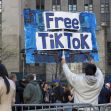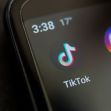Available in the United States since August of 2018, TikTok is a social media app owned by the Chinese company ByteDance that allows users to create and share brief videos. The app provides sound and video effects that are easy to use and can produce sophisticated-looking results. Especially popular with young people, the app has proven an enormous success with an estimated 2 billion downloads worldwide.
On August 6, 2020, President Trump signed an executive order that sought to ban the app because:
the spread in the United States of mobile applications developed and owned by companies in the People’s Republic of China (China) continues to threaten the national security, foreign policy, and economy of the United States.
The order alleges that TikTok automatically captures vast swaths of information from its users… This data collection threatens to allow the Chinese Communist Party access to Americans’ personal and proprietary information — potentially allowing China to…build dossiers of personal information for blackmail, and conduct corporate espionage.
Trump made the order based upon a Carter-era law, the International Emergency Economic Powers Act (IEEPA), that gives the president the authority “to deal with any unusual and extraordinary threat, which has its source in whole or substantial part outside the United States, if the President declares a national emergency with respect to such threat.”
In order to accomplish this, the president may investigate, regulate, or prohibit any transactions in foreign exchange; transfers of credit or payments between, by, through, or to any banking institution, to the extent that such transfers or payments involve any interest of any foreign country or a national thereof.
On the other hand, the act makes it clear that it:
does not include the authority to regulate or prohibit, directly or indirectly any postal, telegraphic, telephonic, or other personal communication, which does not involve a transfer of anything of value.
More specifically, that limitation on executive power includes:
the importation from any country, or the exportation to any country, whether commercial or otherwise, regardless of format or medium of transmission, of any information or informational materials, including but not limited to, publications, films, posters, phonograph records, photographs, microfilms, microfiche, tapes, compact disks, CD ROMs, artworks, and news wire feeds.
Pursuant to the executive order, the Secretary of Commerce published on September 18 the provisions for its implementation, referred to as the “commerce identification” in court filings. On September 27, a ban on distributing TikTok through mobile app stores was to go into effect. The remaining provisions of the commerce identification were set to go into effect on November 12, and include any utilization…of the TikTok mobile application’s constituent code, functions or services in the functioning of software or services developed and/or accessible within the land and maritime borders of the United States and its territories.”
In other words, the order spelled an end to TikTok in the United States.
TikTok sued and petitioned for a preliminary injunction, making the required arguments of likelihood of success and irreparable harm. The likelihood of success argument hinged on the limitations to the president’s power within the IEEPA itself. While the act does allow the executive to ban financial transactions, it makes it clear that that power does not extend to exchanges of information. U.S. District Judge for the District of Columbia (and Trump appointee) Carl Nichols agreed wholeheartedly:
To be sure, TikTok (like a news wire, which is expressly identified in IEEPA’s carveout) is primarily a conduit of “informational materials.” In that sense, it is (among other things) a “medium of transmission” and IEEPA provides that this carveout applies “regardless of format or medium of transmission.”
Judge Nichols granted the injunction with regard to the ban on distribution of the app. However, he did not grant an injunction concerning the prohibitions to go into effect on November 12, leaving that a matter for future proceedings.
The request for the preliminary injunction to halt the other provisions in the commerce identification came in a suit filed by three TikTok influencers in Pennsylvania. (TikTok may seem like a toy, but there is real money to be made from it. The influencers in this suit made a convincing argument that banning TikTok for even a short period would cause them irreparable harm.) On October 30, Judge Wendy Beetlestone granted the injunction, largely on the same grounds as Judge Nichols in Washington.
November 12 then rolled around with no deal in place for ByteDance to divest itself of TikTok. Lawyers for the company requested a 30-day stay of execution. The Trump administration responded by offering a 15-day extension that was allowed to lapse.
On December 7, Judge Nichols was back on the bench and turned his attention to the other items in the commerce identification. He granted a further and sweeping injunction “as to all prohibitions listed in the Commerce Identification.”
The judge’s opinion covered the issue of the IEEPA’s limitations, but also ventured into a further claim that the President’s order violated the Administrative Procedures Act:
the APA directs courts to set aside agency actions that are “arbitrary, capricious…or otherwise not in accordance with law.” Plaintiffs argue…that the Secretary acted arbitrarily and capriciously by identifying prohibited transactions without considering reasonable alternatives.
Therefore, “Plaintiffs have established that the government likely exceeded IEEPA’s express limitations as part of an agency action that was arbitrary and capricious.”
Judge Nichols also ruled that his injunction, although largely covering the same ground as Judge Beetlestone’s, was not redundant and that two injunctions were justified, not least of all because, in the event of the government winning its appeal in the Pennsylvania case, the District of Columbia injunction would still remain in force.
The most recent chapter in TikTok’s legal battles came on December 14, when a three-judge court of appeals panel heard arguments in the government’s appeal of Judge Nichols’ September 27 injunction. Reports of the hearing suggest that the judges – all democratic appointees – were hostile to the government’s case.






